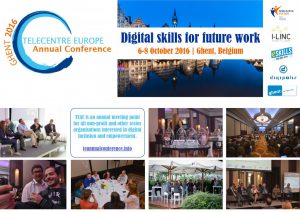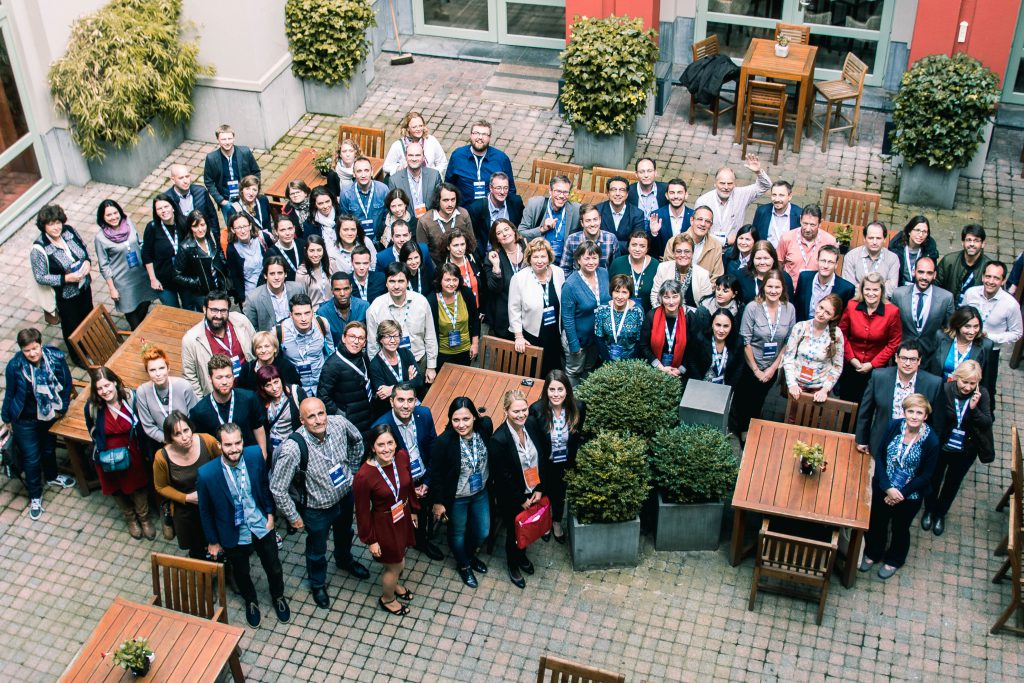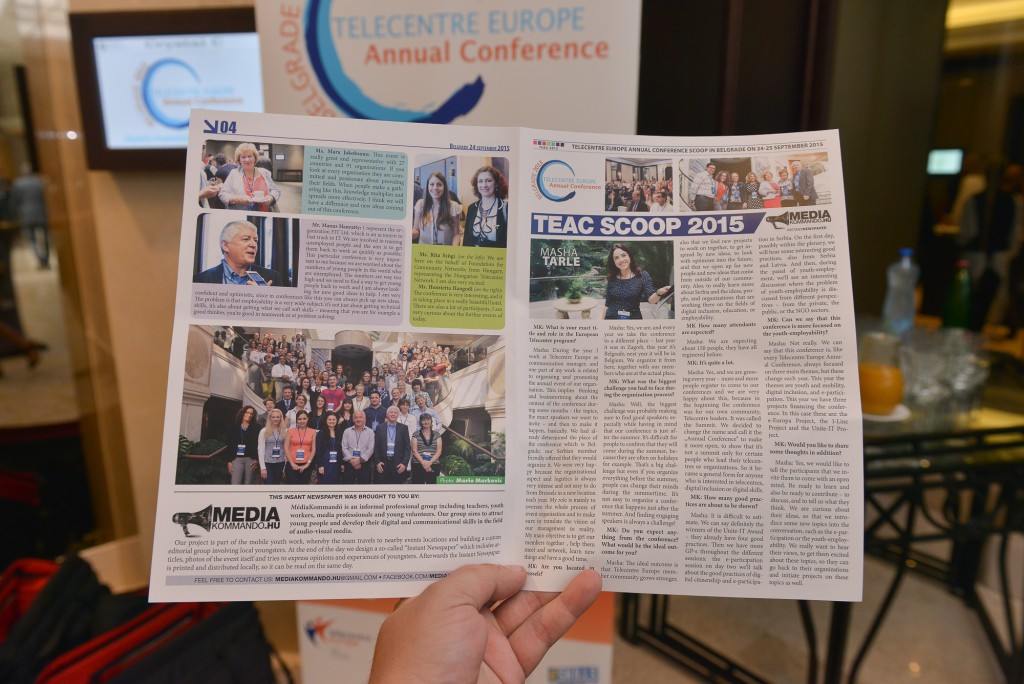03 Oct European Conference in Ghent to address future of work in digital era
03 Oct, 2016

91% of all citizens in Flanders are connected to the internet at home, 78% own a laptop and 58% are the proud owner of a tablet.[1] These recent figures show that we all like to buy the latest
digital devices and update our homes with the latest technologies, but digital skills are indispensable in the workplace as well. The latest digital evolutions translate themselves into new demands at the office, for both the employer and employee. Which skills are increasingly important in the job market and how will organisations adapt to future technological changes?
These are among the issues that will be discussed at the Telecentre Europe Annual Conference jointly organised with the first I-LINC international event in Ghent from October 6-8.
Belgium assumes leading role in Europe
Experts, stakeholders and organisations from across Europe will gather in Ghent to discuss the future digital challenges and the impact this will have on employment. Belgian Deputy Prime Minister and Minister for the Digital Agenda, Alexander De Croo, will talk on the opening day of the conference about the pioneering role Belgium plays with regard to digital innovation and
entrepreneurship within organisations and government.
Alexander De Croo said, “The development of digital economy will define our future welfare. Governments and institutions must show courage and ambition. Belgium has the potential to become one of the leading countries in Europe, but only if it decisively focuses on digital frameworks. Therefore, our strategy ‘Digital Belgium’ focuses on bringing digital skills to people and linking them to the right job. Together with other public and private organisations such as Telecentre Europe, we aim to be one of Europe’s leading digital countries by 2020.”
Ghent invests in e-inclusion
Nine out of ten future jobs will require digital skills. This does not only demand a systematic policy on a national and international level, but also requires the support and effort of local governments. Thanks to their commitment, more and more people are given the chance to unlock their digital potential, regardless of age, social or cultural background.
The City of Ghent has been committed to e-inclusion for the past ten years with Digitaal.Talent@Gent, a program in collaboration with Digipolis and the Public Centre For Social
Welfare. All citizens of Ghent can develop their digital skills through a variety of projects. Even vulnerable groups such as the underprivileged, senior citizens and people with disabilities are given the change to discover their digital talent.
Deputy Mayor of Ghent, Martine De Regge explained, “Every citizen of Ghent deserves to have access to the digital world. In order to guarantee access for everyone, the city has set up 75 telecentres across Ghent. You can visit these centres if you want to use a computer with an internet connection, but also if you want help or advice from one of the computer volunteers.”
The Fourth Industrial Revolution
Beside Deputy Prime Minister De Croo, fellow Belgian Saskia Van Uffelen – CEO of Ericsson BeLux and ‘Digital Champion of Belgium’ – will address the future revolution in the job sector caused by these digital changes. Recent research has shown that 65% of the jobs of today will not exist anymore by 2020[2]. How do we prepare ourselves for these changes and make sure that our employment rates keep rising, as well as productivity rates?
Experts and academics will share their ideas and vision with members of the European Commission. Not only business and the private sector, but the public sector too will need to stimulate and encourage companies and organisations to adapt to these future digital changes in the workplace.
Putting words into action
The so-called “Fourth Industrial Revolution” is one of the major challenges and opportunities for Europe. It describes the changes ahead as a result of new technologies, such as Artificial Intelligence, 3D Printing, Drones, Robotics, the ‘Internet of Things’ and many other emerging technologies and working practices.
Laurentiu Bunescu, CEO of Telecentre Europe added, “This event also presents the first I-LINC international conference. I-LINC is a platform and a community of experts and organisations that foster employment and entrepreneurship through digital skills. We help young people and interested organisations in addressing employability related issues in the light of these emerging technologies.”
The conference brings together organisations, governments and industry to share ideas and to brainstorm the future challenges for jobs and employment in the context of these future changes. Through debates, hands-on workshops and enticing talks, the event aims to set out the future
synergy between work and digital skills.
Māra Jākobsone, Chair of Telecentre Europe said, “A key aspect in teaching skills, which was long underestimated, is finally being recognized by the new EU skills agenda – the importance of lifelong and non-formal learning opportunities. The non-formal education community, represented by Telecentre Europe members offers efficient and fast ways to upgrade digital skills requested for job through mentoring and project-based learning. At the event, more than 120 delegates from 70 organisations in 25 countries will share their experience of helping European citizens to acquire digital skills for future work.”
More Information:
Eveline Versluys, communications manager Digipolis, phone: 0496 32 22 50, e-mail: eveline.versluys@digipolis.gent
Telecentre Europe http://archive.telecentre-europe.org/ is a not-for-profit Association based in Brussels. Their members and partners believe that ICT has great potential to combat social exclusion and poverty. Telecentre Europe coordinates projects, programmes and campaigns that help people learn e-skills and use ICT for their benefit.
The Telecentre Europe Annual Conference https://teannualconference.info/ is the main meeting point of organisations from across Europe working in the field of digital inclusion and empowerment. The event in 2016 forms part of the I-LINC project on future employability, and is hosted by Digipolis the Telecentre Europe member in Ghent.
I-LINC http://www.i-linc.eu/ is an open membership platform that enables people to connect with any stakeholder interested in improving youth employability and entrepreneurship. I-LINC helps find ways to empower young people to become agents of change using Information and Communication Technology as the tool for that change.
Digitaal.Talent@Gent www.digitaaltalent.be is the e-inclusion programme of the City of Ghent, Digipolis Ghent and the Public Centre For Social Welfare. Digitaal.Talent@Gent coordinates projects in and around Ghent to make sure that all citizens, regardless of age or social background, can unlock their digital potential.
The Gent Digital Fair www.stad.gent/digitaledoebeurs combines fun with technology and gives visitors the opportunity to get to know new and innovative start-ups, try out new technologies and discover all the wonders that our digital future holds. From drones and virtual reality to robots and 3D printing, there is something for everyone!
[1] IMinds, 2016 http://www.iminds.be/en/gain-insights/digimeter
[2] World Economic Forum 2016, http://reports.weforum.org/future-of-jobs-2016/chapter-1-the-future-of-jobs-and-skills/








